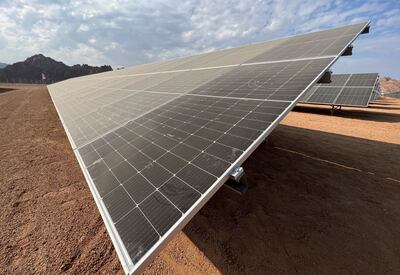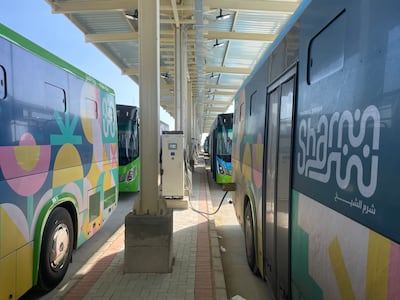
Sharm El Sheikh’s ‘truly surprising’ changes a week before Cop27
A fervent hastiness permeates the Egyptian Red Sea city of Sharm El Sheikh this week as it prepares to host the UN climate change conference Cop27, which starts on November 6.
Construction crews and heavy machinery were visible in almost every district of the city on Thursday.
While some were busy repaving large stretches of the city’s roads, others were hard at work levelling parts of its mountainous terrain for the installation of billboards bearing the conference logo.
“I hadn’t been in town for a few weeks as I was visiting my family,” a 47-year old taxi driver from the city told The National. “But when I returned, I was truly surprised by how different the city was to when I left. There were entirely new roads in areas that are usually left untouched when the city prepares for such conferences.”
Residents said the government’s efforts to prepare it for the conference — expected to attract a lot of media coverage — reached a fever pitch in late June when several of the city’s main streets and most-visited sites were closed for weeks on end for renovations.
New roads and flyovers have been built along with several bicycle lanes on many of the city’s main roads.
About 15 billion Egyptian pounds ($650 million) has been spent on the city’s development for the conference, said the governor of South Sinai, the larger province of which Sharm El Sheikh is a part, earlier this month.
A large portion of the money went to improving environmental aspects of the tourist town in line with the theme of the conference.
The National spoke to Nour El Din Mohamed, a solar power engineer at one of several plants that have begun operations in the city in the past few weeks.
He said tremendous pressure had been put on the private company that built the plant to complete it as fast as possible in time for the conference.
“Just under three months ago, this was an empty piece of land, but the government was keen to have all the city’s green projects up and running before November,” Mr Mohamed said, pointing to a large expanse of desert covered by more than 9,000 solar panels west of the city.

He said most of the city’s solar farms have been successfully connected to the national grid, and are only awaiting final agreement between the private companies that operate them and the government.
The importance of ensuring the country’s status as an environmental showpiece in recent weeks was also apparent at a terminal built in September to house a new fleet of 140 electric buses.
Saeed El Refaey, the terminal’s director of operations, told The National that there was also tremendous pressure from the government to have the terminal start operations ahead of the conference.
“All the functional aspects of the terminal are complete, all that’s left are just finishing touches, such as fencing the area, building the visitors’ centre and the drivers’ quarters,” Mr El Refaey said.
The terminal includes 70 vehicle chargers. It was packed with off-duty buses on Thursday. But around its central area, there was still some work to be done to the perimeter and entrance.
The buses were transporting passengers on Thursday. Many also lined up at petrol stations recently installed with electric chargers.
Ahead of Cop27, bus fares were waived by the city’s municipality, with a 15 pound (about $0.65) ticket charge coming into effect after November, Mr El Refaey said.

A significant increase in the security presence in the city is also causing disruptions to its normally quiet streets. Around the city’s Old Market on Thursday, a group of non-uniformed men stood visually inspecting passing cars. Other police checkpoints on previously empty roads were also inspecting passing cars.
Another taxi driver said that the men were General Intelligence Service officers who have been stationed there since the service took over securing the city ahead of the conference.
The governor of South Sinai’s office confirmed from its side that the GIS and the National Security Agency had taken over the task of securing the city before the conference.
A hotel manager in the city’s Al Hadaba district told The National that although its tourism sector had recorded a marked recovery earlier this year, a drop in tourists occurred about two months ago, which he attributes to disruption caused by the extensive preparations.
The city’s traffic control unit mandated earlier this month that all taxis must install a new smart monitoring device comprising a security camera and a microphone that feed the sound and image to a control unit run by the city’s municipality.
The surveillance system was met with mixed reactions from taxi drivers, many of whom reported feeling uncomfortable with what they consider an intrusion on their privacy.
Despite the undeniable hubbub caused by the conference, many of Sharm El Sheikh’s residents expect things to return to normal when it closes at the end of November.
Cop27 takes place from November 6 to 18 at the Sharm El Sheikh International Convention Centre.

Post Discussion